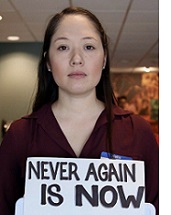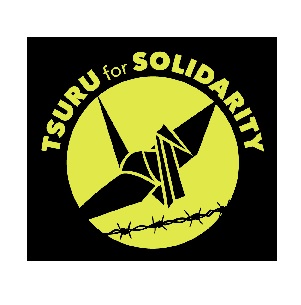
Just 77 years ago, Lisa Doi's family was
forced into concentration camps in Rohwer,
Crystal City, Santa
Anita, and Tanforan.
Now Doi's work focuses on awareness and racial healing to ensure
that the internment of over 125,000 Japanese Americans is never
forgotten or repeated. As a community organizer for Tsuru
for Solidarity, Doi is helping to end all concentration camps
in the United States. She is also the president of the Japanese
American Citizens League (JACL) Chicago where she has
facilitated youth-focused pilgrimages to Manzanar,
Rohwer, and Jerome.
We spoke with Doi about social justice work and what inspires her.
 What first drew you to social justice work?
What first drew you to social justice work?
I grew up in the Japanese American community in Chicago. In
hindsight, I realize I had a lot of exposure to JA cultural
organizations as well as a strong sense of JA identity at home--and
that this wasn't an experience that many of my peers had due to the
history of post-war forced assimilation. I also grew up in a very
wealthy community and I think that made me very aware of deep
inequality that I was the beneficiary of. I think these were two
factors that shaped my sense of justice and my desire to shape the
future of the Japanese American community.
How did you become an organizer for Tsuru
for Solidarity?
I first got involved in TFS in mid 2019 when we were preparing for a
national gathering in DC. TFS was looking for more geographical
representation and I was brought in to help represent Chicago. Then
I got hired to manage the national gathering, which was ultimately
cancelled due to COVID. I was the first staff person for Tsuru, and
Mike Ishii and I (and AMAZING volunteers) have gotten the honor of
shaping the organization slowly over time.
What does a typical day look like for you?
I work at TFS part time and we're a virtual organization.I also am a
PhD candidate in American Studies at Indiana University--I'm
currently teaching a class to undergrads now--and I also work for
the Japanese American National Museum. A typical day for me looks
like a lot of Zoom meetings!
Although I have a few different jobs, they're all really related to
each other, so I spend a lot of time thinking about Japanese
American history and contemporary community building. I also attend
a lot of coalition meetings with other Asian American and BIPOC
serving organizations. As a volunteer-led movement, I have a lot of
late night meetings for Tsuru, but try to balance that out by
spending time during the day reading and writing (both for fun and
for my school work).
 What has been
the most eye-opening thing you have learned while working for
Tsuru for Solidarity?
What has been
the most eye-opening thing you have learned while working for
Tsuru for Solidarity?
Wow! What a great question. I have changed so much through working
for Tsuru for Solidarity. One thing that comes to mind is how much
people and moments can shape communities. I remember trying to have
conversations about abolition within the Japanese American community
in 2017-2019 and, while I was personally supportive, never feeling
like this could be a mainstream conversation.
Then in 2020, we co-facilitated the Nikkei Abolition Study Group and
got hundreds of Japanese Americans from across the country to gather
regularly and discuss abolition. In just a few years it went from
seeming like something totally impossible to something that was
achievable.
Similarly, today I had the last coalition meeting for the Shut
Down Berks campaign because WE WON the fight to shut down the
Berks County Residential Center, an ICE facility in central PA.
After years of community led protest and advocacy, the contract was
ended and everyone in the facility was released. But I also get to
imagine a new future for the Japanese American community, one that
is healed not just from the wartime incarceration, but also the
post-war efforts at assimilation and model minority ideology. This
is a community I cherish and one that I am grateful to be part of.
What resources would you recommend for someone who wants to
get involved in social justice work?
One of the ways that Tsuru understands solidarity is that the work
we do is not for other people, but is tied to our own personal,
familial, and community healing. I think finding the work you must
do is essential. One a more tangible level, I came across both
Eduardo Galeano and Paul Farmer in high school and I think they are
the two writers who have most influenced my thinking (but don't read
Galeano's The Open Veins of Latin
America, even he didn't like that book, try something
like Upside Down).
Who or what do you look to for inspiration?
I think a lot about my matrilineal lineage: my mom, my mom's mom,
and my mom's mom's mom. I think these are women I learned so much
from and who really animate most of my work. My great grandmother,
Sano, died while she was incarcerated in Arkansas and I think about
all that I can never know about her life and experience. I think
about my grandmother and her experience with Alzheimer's and the
ways in which it was healing to have this really long process of
mourning her. And I think most about my mom, who had me volunteering
at JA community events when I was a little, little kid. I would not
be who I am today without them. By extension, I think often of other
JA women, often unsung, from who I have inherited so much.
Is there one piece of advice that you have found to be the
most helpful?
I think one piece of advice that I try to live into is thinking if
what I'm about to say or do is the next most kind or gentle thing
that I am able to say or do in that moment. If it's not, can I hold
myself back from doing it? Not easy!
What is something one should never forget while being an
activist?
I think of myself more of an organizer than an activist (and respect
both), but as an organizer I think my role is to mobilize people to
take action together. I'm sure I don't always do this well, but I
think one thing that organizers should think about is how to make
space to welcome people where they are at and that we smooth out our
rough spots by rubbing up against each other.